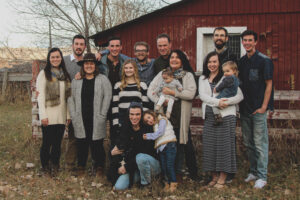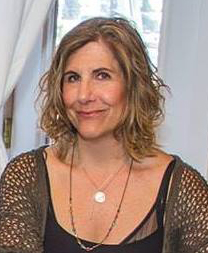By Linda Quon
 Brian Carmack lives a full and busy life. As a husband, father of 9 children, graduate student and lead pastor of Eastside Foursquare Church in Prineville, he talks openly about the joys and stresses that come with following your passions.
Brian Carmack lives a full and busy life. As a husband, father of 9 children, graduate student and lead pastor of Eastside Foursquare Church in Prineville, he talks openly about the joys and stresses that come with following your passions.
With five biological and four adopted children, Carmack and his wife Tricia have nurtured a loving family and home. Over the past 11 years, they have fostered 25 children. With seven kids successfully launched (five in college now), the couple recently adopted what they believe will be the last of their brood. At 51-years-old, the youngest children — ages 4 and 1 ½ — keep him and Tricia on their toes.
“It’s beautiful and stressful to create new lives for children who have experienced hardship and trauma,” said Carmack. “It can also bring deep grief and pain when you have to let them go, sometimes back to difficult situations.”
Carmack, whose father was also a pastor, has worked as a pastor for the last 26 years. Five years ago, he accepted the lead pastor position with Foursquare Church and he takes that responsibility seriously.
“There is a whole new level of worry and concern stepping into those lead pastor shoes and it caught me by surprise. Much like foster care, you are often connecting with people who are hurting and broken and you are walking alongside them as they heal. It’s a great honor and privilege to be part of that journey,” he said.
After working a full day at the church, Carmack spends quality time with his family before hunkering down to study for his Master’s degree in strategic leadership. These labors of love fill him up and also require tremendous amounts of energy. He often finds himself striving for perfection and struggling with a fear of failure or disappointing or hurting those he’s working to help.
To help mind his mind on a daily basis, Carmack has a few tricks to share.
Seeking out therapy and coaching
Three years ago, Carmack recognized that he needed extra support to deal with his stress and the pressure he was putting on himself to be perfect. He was able to connect with a therapist and life coach, which helped him set aside the stress and focus on his dreams and a vision for the future.
“I have always been able to have deep conversations with my wife and people close to me but seeking professional support outside of my circle of influence was more helpful than I imagined. I would say that everyone could benefit from therapy. We all have internal issues, and we all need to have a place to have safe and honest conversations,” said Carmack.
Taking a break from the noisy world
“Every week, I observe Sabbath, taking 24 hours to disconnect from technology, connect with my family and God and spend some time alone. The world we live in can be very loud and our society has an intolerance for silence which is something we all really need, especially during stressful times like these with the pandemic and a political divide unlike anything I’ve ever experienced in my lifetime,” he said.
Practicing prayer & meditation
For Carmack — and most of us — stress can create physical illness, sweaty palms, increased heartrate and loss of sleep and appetite. Daily prayer and meditation helps him reset and balance.
Striving to love, listen and learn
Carmack says that surrounding himself with love, human connection and a connection with God helps him find calm and peace. This is especially important, he says, with people he’s in disagreement with.
Actively listening to the perspectives of others and learning from them is also important to him.
“Our church and community are made up of wonderful people with very diverse opinions. We don’t have to agree, but we can come together and have respectful dialogue. That’s the only way we will live peacefully among our religious and political differences,” said Carmack.
Painting and drawing
Engaging the creative side off his brain and learning new skills also helps Carmack manage stress.
“Painting and drawing brings quietness to the loud part of my brain,” he says.
Why talking is so important
While Carmack grew up in a loving and accepting environment where he felt he could talk to his parents openly, he explained that we have more language to do that at our fingertips today.
“It’s easy to internalize things we feel like we can’t share. We need safe places to talk and people we trust to talk to. The more we talk about our struggles with mental health, the stronger our communities will be,” said Carmack.
 Linda Quon is Vice President and Director of Communication at Quon Design and Communication. Linda is working to promote everyday mental health awareness in partnership with Deschutes County Health Services and Central Oregon Health Council — which includes providers and health advocates from Crook, Jefferson, and Deschutes Counties. Linda was born and raised in Southern California and moved to Central Oregon with her husband and two children in 2005. Her mother lived with Schizophrenia and bi-polar disorder and her oldest brother also experienced bi-polar disorder. With support from family, friends, therapists and primary care providers, Linda has been navigating the world of mental illness most of her life — including her own struggles with mild anxiety and depression. Linda is proud to work as an advocate for mental health and a blogger for Mind Your Mind Central Oregon.
Linda Quon is Vice President and Director of Communication at Quon Design and Communication. Linda is working to promote everyday mental health awareness in partnership with Deschutes County Health Services and Central Oregon Health Council — which includes providers and health advocates from Crook, Jefferson, and Deschutes Counties. Linda was born and raised in Southern California and moved to Central Oregon with her husband and two children in 2005. Her mother lived with Schizophrenia and bi-polar disorder and her oldest brother also experienced bi-polar disorder. With support from family, friends, therapists and primary care providers, Linda has been navigating the world of mental illness most of her life — including her own struggles with mild anxiety and depression. Linda is proud to work as an advocate for mental health and a blogger for Mind Your Mind Central Oregon.
